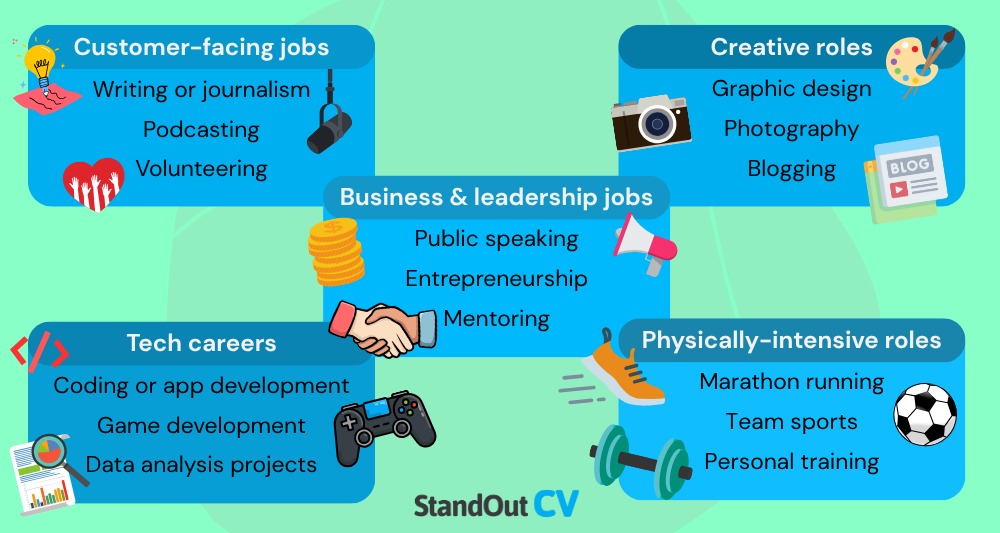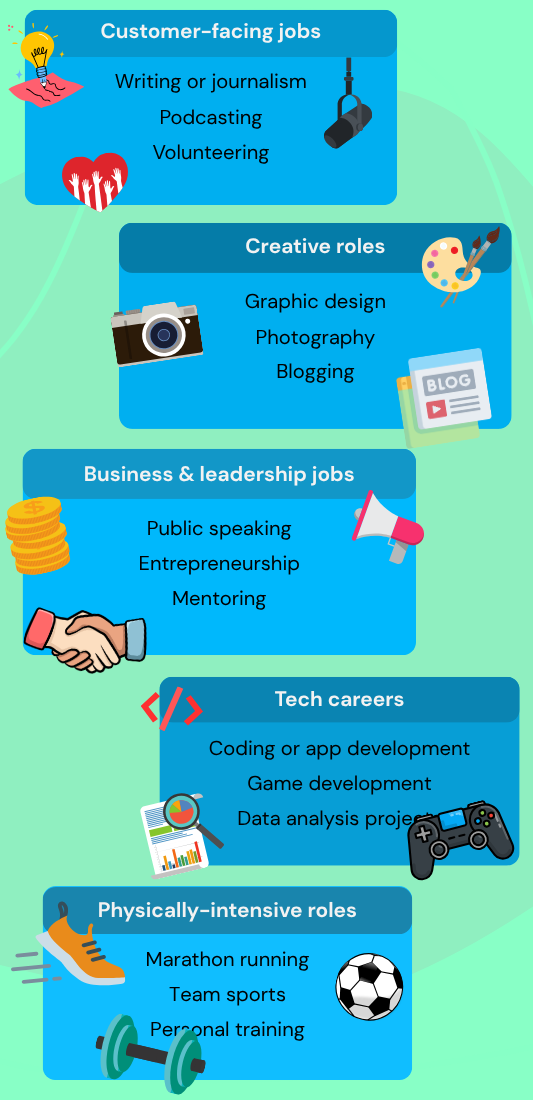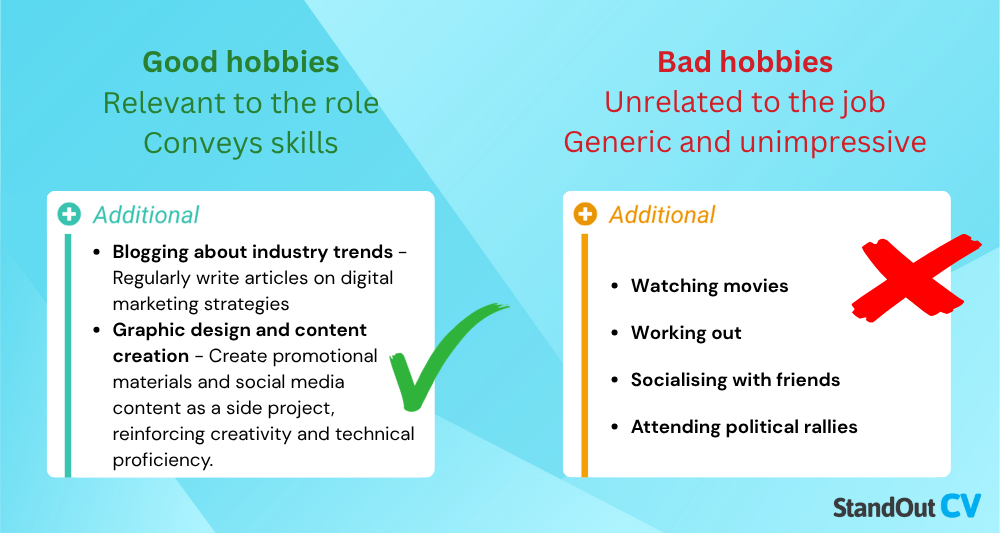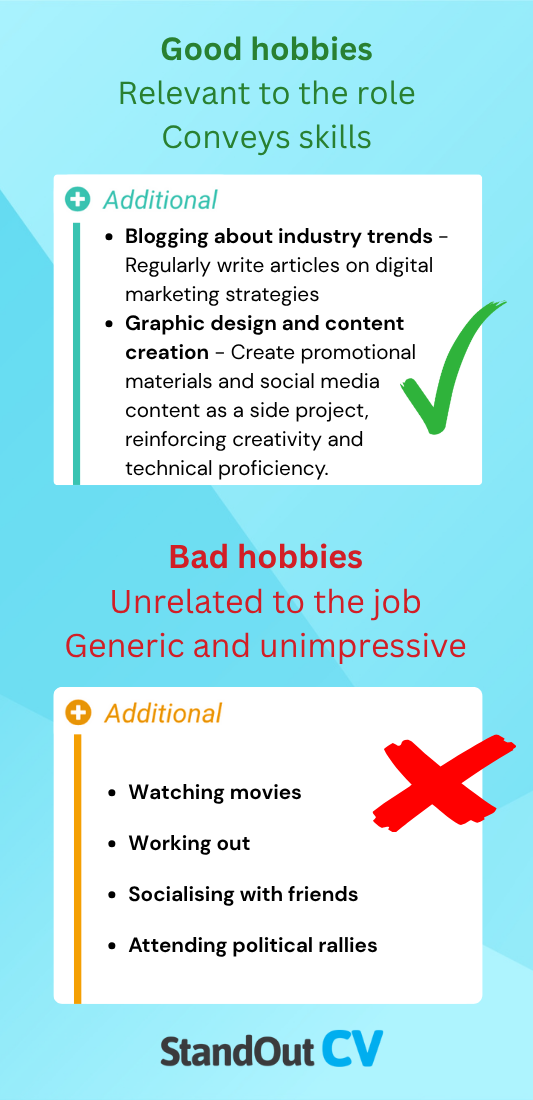When most people write a CV, hobbies are the last thing on their mind. Work experience, skills, education – those always come first, right?
But can listing your hobbies and interests make a difference in landing a job?
The short answer: it depends. The right interests can show the personality, soft skills, or commitment that employers value. The wrong ones can just take up space.
If you’re wondering whether to include hobbies on your CV, I’ll show you which hobbies are worth including, when and how to present them properly, and which ones are best left off your CV.


Best hobbies for your CV
- Volunteering – Shows initiative and community engagement, along with a willingness to contribute beyond personal gain.
- Team sports – Highlights teamwork and communication skills.
- Blogging or writing – Demonstrates written communication skills and creativity, especially useful in content or media roles.
- Coding or app development – Proves technical ability and your passion for digital innovation.
- Public speaking or debating – Reflects confidence, critical thinking, and persuasive communication.
- Art or design – Indicates creativity and attention to detail – ideal for creative roles.
- Learning new languages – Suggests cultural awareness, dedication, and strong cognitive skills.
- Fitness or endurance activities – Conveys discipline, goal-setting, and mental resilience.
Best CV hobby examples
Ideally, the hobbies you list will reinforce your professional strengths and key skills. As you’d expect, these vary depending on the industry you’re aiming for jobs in: here are some of the best hobby examples for different job types.
Communication and customer-facing jobs 💬
If your career involves public relations, media, or customer relations, hobbies that highlight strong communication skills will help set you apart.
- Learning new languages
- Writing or journalism
- Podcasting
- Volunteering
- Event planning
✅ Why it works: These CV hobby examples reinforce interpersonal skills, storytelling abilities, and cultural awareness – essential for roles that require strong public engagement.
Creative roles 🎨
Hobbies that demonstrate creativity, artistic talent, and an eye for detail can be a great addition if you’re applying for roles in design, marketing, or content creation.
- Animation
- Graphic design
- Photography
- Blogging
- Painting or digital art
- Video editing
✅ Why it works: These examples of hobbies highlight creative thinking and a strong aesthetic sense – qualities highly valued in creative industries.
Business and leadership roles 👔
If you’re applying for managerial or leadership positions, hobbies that reflect strong communication, decision-making, and organisational skills can be a plus. These CV hobby examples reflect those skills.
- Public speaking or debate club
- Entrepreneurship (running a small business or side hustle)
- Mentoring or coaching
- Toastmasters or networking events
- Organising charity fundraisers
✅ Why it works: Employers look for leaders who can inspire teams, strategise effectively, and think critically. If you can do so in your spare time, then you’re well-positioned to bring it to the workplace.
Tech careers 🖱️
For tech-driven industries, personal projects and technical hobbies can showcase problem-solving skills and a passion for innovation.
- Coding or app development
- Game development
- Data analysis projects
- Cybersecurity challenges
- Robotics or AI programming
✅ Why it works: Employers in tech fields appreciate candidates who work on projects outside of work. It shows initiative, continuous learning, and technical expertise.
Physically-intensive roles 💪
Some hobbies emphasise discipline, resilience, and determination, making them useful additions to your CV, especially in physically demanding jobs.
- Marathon running
- Martial arts
- Yoga instruction
- Team sports
- Personal training
✅ Why it works: Employers value commitment and perseverance, and these hobbies show dedication to self-improvement and teamwork.
Hobbies you shouldn’t include in your CV


Your CV is there to land you an interview, not a date, so pick hobbies that impress employers – not ones that just make you sound fun at parties. In a professional context, some can be too vague or even raise concerns. Your CV isn’t long, so don’t waste space writing things that aren’t helping your odds of landing a job.
Avoid hobbies such as:
- Anything too generic, such as watching TV or listening to music
- Controversial topics, including politics, extreme activism, or religious affiliations, which could lead to bias in hiring
- Hobbies with negative connotations, such as gambling, excessive gaming, or anything that could be seen as unprofessional
Should you add hobbies to your CV?
The truth is, hobbies and interests generally aren’t required or expected from applicants. They’re extremely unlikely to sway recruiters one way or the other – whether or not to include them depends on your level of experience, the industry you’re applying to, and how well your interests align with the jobs.
You should consider including hobbies if:
- You are a recent graduate with little work experience.
- Your hobbies are highly relevant to the role and highlight valuable skills.
- You’re applying for a creative or tech-driven role where personal projects matter.
- You want real-world examples that better emphasise your soft skills.
It’s better to leave them out if:
- Your CV is already filled with strong experience and qualifications.
- The hobbies don’t add any real value or don’t relate to the job.
- You’re applying for a corporate or highly formal role where personal details are less relevant.
Here’s a tip: if in doubt, ask yourself whether the hobby helps demonstrate your abilities, personality, or work ethic in a meaningful way. If the answer is no, it’s better left out.


How to add hobbies to your CV
If you’ve thought about it and decided that your CV would benefit from adding some hobbies, you’ll need to know where to add them.
Even if your hobbies and interests truly are pertinent, they’re still less valued by recruiters than your experience, achievements, and qualifications: so they should go in a section at the bottom of your CV, titled “Hobbies & Interests” or simply “Additional info”.
Make sure to format them with a brief explanation to really drive home why your hobby is valuable.
Junior candidates with little to no experience should include a quick mention in their personal statement (or CV profile).



